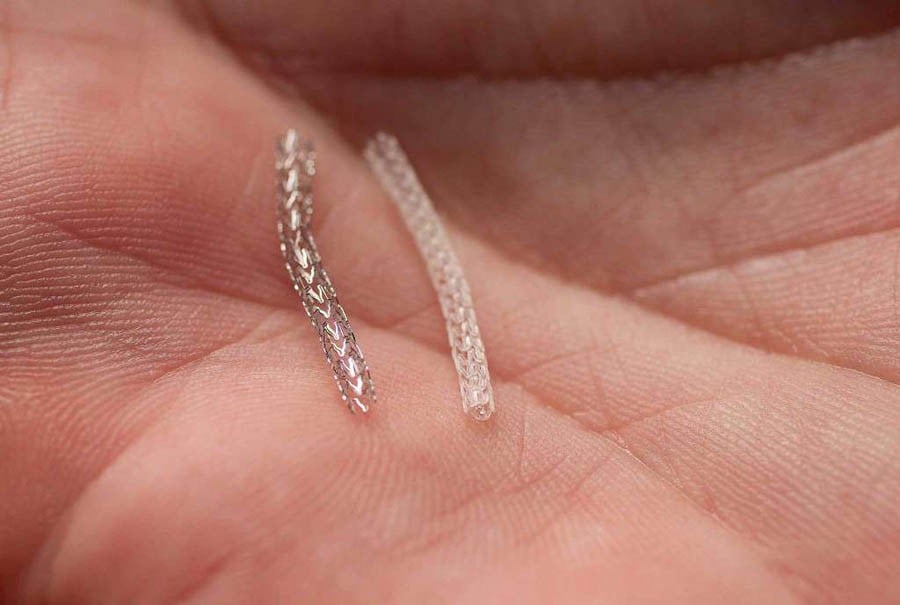
Majority of people who were scheduled to undergo stent surgery have put them on hold after the scam came out in the open. Nobody from the stent mafia has been arrested so far

Mohsin Raza, who was recommended a stent implant, is at sixes and sevens. A week after consultation with doctors, he and his family are fearful and indecisive about the surgery. "How can I risk my life when I know that stents may be fake, substandard, expired and overpriced," he says, while sitting outside a doctor’s clinic in a private hospital in Lahore. "Frankly speaking, I’ve lost confidence in our medical system."
Raza is not an exception. The horrifying stent scam has alarmed a number of heart patients. They have put the recommended stent surgery on hold at least for the time being.
Forty three year old Saira Fiaz, who was initially recommended a stent surgery, has consulted five cardiologists in five different hospitals in the past few days. As a result, she’d rather get a bypass surgery done than a coronary angioplasty.
Meanwhile, many people that got stent implants last year are rushing to see their doctors, worried about the quality and condition of the contraption implanted in them.
A stent is a small mesh tube meant to open obstructed arteries so the blood flows in them normally. The procedure is called Percutaneous Coronary Intervention (PCI) or Coronary Angioplasty.
Stents are usually made of metal mesh and fabric. Some stents are coated with medicine called drug-eluting stents. A stent may fracture or dislodge if its quality is compromised, and cause restenosis or stent thrombosis (blood clotting). All stents available in Pakistan are imported and we do not have a "test lab" to check their quality. It is not even decided whether stents are a medical drug. There are 96 cardiac devices that remain unregistered.
According to Shifa International Hospital, Pakistan’s population has one of the highest risks of coronary heart diseases in the world. "In Pakistan, amazingly, 90 per cent patients are recommended stents. The reason is the hefty profit those involved in the procedure are likely to make," says an official of Pakistan Pharmaceutical Association (PPA).
Contradictory statements issued by Punjab Minister for Specialised Healthcare and Medical Education, Khawaja Salman Rafique, and Drug Regulatory Authority Pakistan (DRAP) CEO, Dr Muhammad Aslam, only worsen the situation. "Stents used in angioplasty are not produced locally and terming unregistered stents as fake is not appropriate," states a handout issued by Rafique. Whereas, a statement issued by Dr Aslam says, "Stents are found fake and unregistered during investigation".
Aslam admits that this malpractice has been taking place for many years, and doctors have used angioplasty as a money-making venture. "Counterfeit, unregulated and expired stents have affected many heart patients".
Endorsing the Federal Investigation Authority’s initial inquiry report submitted before the Supreme Court of Pakistan last week, he says that a preliminary report prepared by DRAP’s probe team furnished four points: "Sale of illegal and unregulated stents continues unabated. Most of them are about to complete their shelf life or are expired. They are also smuggled massively. A number of them are fake or copied from China and Hong Kong. Patients are compelled to purchase stents on exorbitant rate which are 7 to 9 times higher than the original price."
Pakistan had no mechanism in place to regulate stents before 2010. DRAP started registering all genres of stents in 2011, and over the years has laid down a "compact and comprehensive system".
"We have registered 55 various types of stents, including bare metal and drug-eluting stents that are of the highest quality. They are not manufactured locally, and are imported from the US, European Union and Japan," says DRAP CEO, continuing that to counter mafia, DRAP promulgated Medical Device Rules 2015 but pharmacists and manufacturing companies got stay order against it from courts. "Legal lacuna may be eliminated if provincial governments are able to devise rules."
He claims that DRAP investigation team has completed its work in Lahore. "It has expanded its investigation to Karachi, Islamabad, Peshawar and other major cities to map out a fact-finding report to be presented to high-ups within 10 days."
In the wake of the stent scam, the companies that had resisted registration earlier on have approached DRAP. Around 50 applications have been submitted and 21 have been registered.
A doctor associated with the Punjab Institute of Cardiology, who prefers not to be named, says, "Our investigations on the increase in number of patient with chest pain after angioplasty discovered that stents (costing Rs150,000 to 200,000) were damaged and arteries were blocked again."
The Pakistan Medical Association (PMA) praises the Supreme Court for taking up the case, and denounces the mafia of stent sellers. It demands a uniform pricing system.
Pakistan Pharmaceutical Association (PPA) President Qalb-e-Hassan Rizvi alleges that a racket of doctors, businessmen and officials are behind the heinous crime. "There have been cases in which patients did not require stents but doctor fraudulently convinced them of the urgency of the surgery. Later, they discovered that stent was never implanted."
Rizvi suggests increasing the number of drug inspectors to bring stent smuggling to a complete halt. He also calls on PMDC, PMA, Health Ministry and other health departments to devise a "doctors’ ethical code of conduct".
No one has been arrested till the filing of this report. FIA has asked Provincial Quality Control Board (PQCB) to book Dr Saqib Shafi, head of Cardiology Department, Mayo Hospital. It is learnt that around 10 companies are likely to be booked and their heads put on ECL.
While the Supreme Court hears the case, the Punjab government has begun to audit hospitals in the light of Chief Minister Inspection Team (CMIT) report. DRAP, FIA and Health Department have been preparing their individual reports on the issue to be submitted to the apex court.